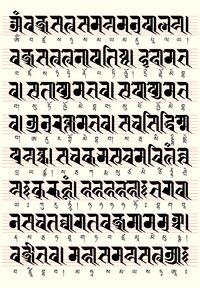Hundred Syllable Mantra
Hundred Syllable Mantra (yig brgya)
- The hundred-syllable mantra of Vajrasattva may be literally translated as follows: OṂ (excellent eulogy)! Vajrasattva! Protect my commitments! Vajrasattva! Stabilise them! Let me be steadfast! Let me be satisfied! Let me be nourished! Let me be loved! Bestow all accomplishments upon me! With regard to all my past actions, make my mind virtuous! HŪṂ (seed-syllable of buddha-mind)! HA (four immeasurables)! HA (four empowerments)! HA (four delights)! HA (four buddha-bodies)! H0Ḥ (joyous laughter)! Transcendent One! Indestructible Reality of all the Tathāgatas! Do not forsake me! Make me into indestructible reality! Great Being of Commitment! ĀḤ (non-dual union). See also S. Beyer, The Cult of Tārā, pp. 144-5; and BbDud-'joms Rin-po-che, The Preliminary Practice of the New Treasure of Dudjom, pp. 30-33. The recitation of this mantra, in conjunction with the visualisation of Vajrasattva and the confession of negativity, is included among the preliminary practices (sngon 'gro) of meditation. The objective of this specific practice is the purification of hatred and aversion. On this, see dPal-sprul Rin-po-che, The Words of My Perfect Teacher, pp. 263-280. GD (from the Glossary to Tibetan Elemental Divination Paintings)
The Hundred Syllable Mantra of Vajrasattva is as follows, in both lower-case and upper-case Roman letters: a) oṃ vajrasattva samayam/ anupālaya/ vajrasattva tvenopa/ tiṣṭha dṛḍho me bhava/ sutoṣyo me bhava/ supoṣyo me bhava/ anurakto me bhava/ sarva siddhiṃ me prayaccha/ sarva karma su ca me/ cittaṃ śreyaḥ kuru hūṃ/ ha ha ha ha hoḥ/ bhagavan sarva tathāgata vajra mā me muñca/ vajrī bhava mahā samayasattva āḥ (hūṃ phaṭ); b) OṂ VAJRASATTVA SAMAYAM/ ANUPĀLAYA/ VAJRASATTVA TVENOPA/ TIṢṬHA DṚḌHO ME BHAVA/ SUTOṢYO ME BHAVA/ SUPOṢYO ME BHAVA/ ANURAKTO ME BHAVA/ SARVA SIDDHIṂ ME PRAYACCHA/ SARVA KARMA SU CA ME/ CITTAṂ ŚREYAḤ KURU HŪṂ/ HA HA HA HA HOḤ/ BHAGAVAN SARVA TATHĀGATA VAJRA MĀ ME MUÑCA/ VAJRĪ BHAVA MAHĀ SAMAYASATTVA ĀḤ (HŪṂ PHAṬ). [Erick Tsiknopoulos]
